|
Is God real?
Take ten minutes to think about it.
Please read these few paragraphs.
The following will assume that you either do not believe in God, or
are not truly sure if you believe in God. For those of you who do believe
in God, read it anyway, you might learn something.
Why do you not believe in God?
Because you don't want to be like some people you've met or
know personally? You think that church is for suckers? Religious
people are just weirdos?
Those people seem judgmental, hypocritical, weird, overzealous, or you're
just not sure what to think about them - you just know that you're not like
them, and don't want to be like them.
Well, you don't have to act like them to believe in
God. To believe in God is a very personal thing, and it's only between you
and Him. You make the decision. His approval is all you need, not
the approval of others. So don't worry about those "religious"
people who have made you wary in the past - it's not their lives your living -
it's yours. And fortunately, they're the ones who have to live their
lives, not you.
If you have a gut feeling that the beautiful world around
you was created by something that you don't fully understand, you're on the right
track. Keep your eyes open, and you can see God's handiwork all around
you. What more proof do you need? Don't let your past experiences
with religion, churches or churchy people prevent you from realizing the truth.
How do you think this world came into being?
Do you really believe the "theory" that one day,
millions of years ago, some mysterious "bang" happened and suddenly
life was set into motion?
And, from that initial mysterious event, the world has
evolved the myriad of beautiful and complicated creatures and ecosystems that
exist today?
Please don't be fooled into thinking that scientists know
everything, and that science can explain everything.
The essence of science is to explain what we see around us
in the natural world - with
the first assumption being that God is NOT real.
So, all attempts to explain how things came into being are
man's attempt at using minimal information to explain something that is
completely beyond his understanding.
Yes, there may be "evidence" that supports their
theories, but "common sense" does not. One day their
"evidence" will be proven to be false, misunderstood, or in some way
fallible.
The best scientists in the world used to think the world
was flat - used to use leeches to dispel "bad" blood from the body -
used to think that the sun revolved around the earth - used to think a whole
host of things that now seem very, very silly to us. How can anyone
possibly think that in 50 years, we will not look back on many things we think
we know now, with the same knowledge, and consider them to be archaic and silly.
Perhaps Socrates said it best. "One thing only I know,
and that is that I know nothing."
Remember that feeling that you have when you see a
beautiful bird or a beautiful seashell or something that just amazes you with
its beauty and complexity. That gut feeling is kicking in.
Don't let your brain just dismiss it. This is important. If God
really is real, and really is out there, and really is the amazing being that
created our incredible world full of beauty, power and complexity, don't you
want to know more about someone like that? or are you just scared that you
may have to change a little bit?
Grow up! Life is short, and there are many important
things for you to learn and experience during your time on Earth that will make
you a full and well rounded person. Being resistant to change or challenge
is a huge roadblock that will keep you from growing and realizing the peace and
security that comes from true wisdom.
Do you believe in the theory of evolution?
The theory of evolution basically says that all life began
from a single cell organism, and over time - lots of time - that single cell
organism has mutated into millions of species of mammals, fish, birds, insects,
reptiles, plants, flowers, etc....
The idea is that as the various organisms lived their
lives, those with less desirable features - features that made it more difficult
for them to survive - would die off, thereby leaving only the creatures with the
more desirable features to procreate. Over time the features that
inhibited survival would be bred out of existence. Darwin called this
"survival of the fittest"
So it would follow that the creatures that we see all over
the Earth now are very far along in the evolutionary process, and that the
features that they exhibit (some of them spectacular in the beauty and practical
design) were not original to the species, but are a product of a series of
mutations and years of "natural selection"
Does this make sense? This theory seems that it would
produce a series of very utilitarian creatures, with the only purpose being
survival and procreation. And it follows from the theory that once this
minimal level was reached, that a more elevated level could never be
achieved.
For example, as a certain species of brown duck evolved,
once the duck had evolved the skills needed to survive (fishing, staying
warm/dry, procreation) - then that duck would not need to evolve more features
to survive, right? And even if a duck or two mutated a bit and showed a
little color, that color feature would never be carried exclusively to the next
generations, because the plain brown ducks would continue to survive and
procreate, thereby diluting the gene pool.
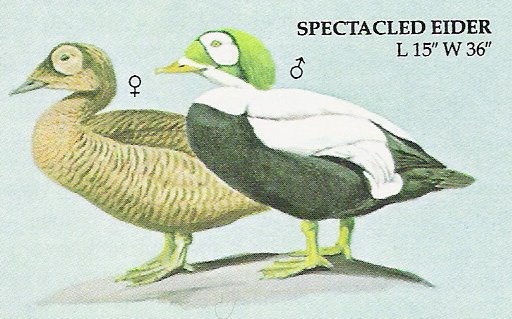
Let's take the Spectacled Eider here. For you to
believe in the theory of evolution you would have to believe the following:
1: In this line of evolution, only ducks that showed
lime green on their heads were able to survive.
2: Only the ducks who began to show a perfect circle
pattern of white with black trim around their eyes were able to survive.
3: Those ducks who did not have the perfect shade of
lime green, or whose eye patch was not perfectly round or trimmed with a black
ring - they died before they could procreate.
4: This tragic situation continued until only the
creature you see above survived with those features that are so important to
survival - a lime green head and a white eye patch with black trim.
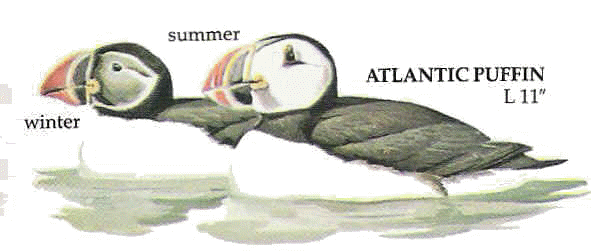
Think of the same rationale as you look at the birds
below. Patterns, colors, size, shape, odd features. Do you think
it's possible that the birds who didn't have exactly the patterns, colors,
etc... you're seeing below just couldn't survive because of it?
Why?
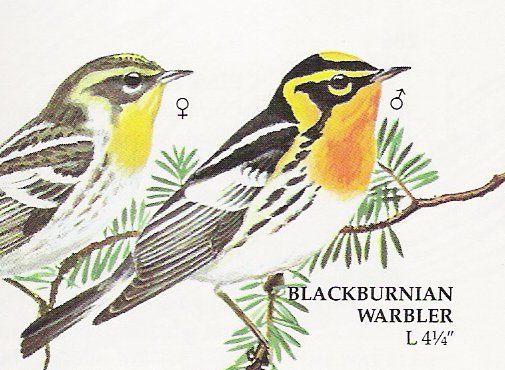
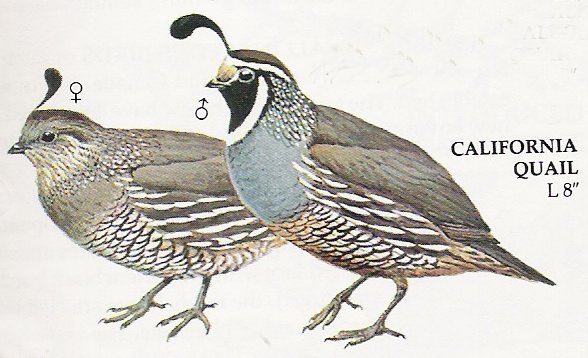
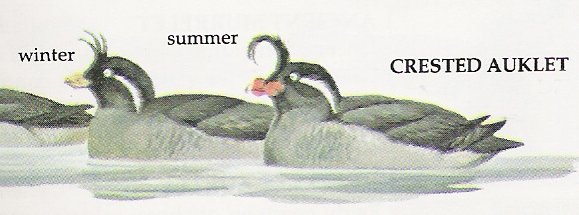
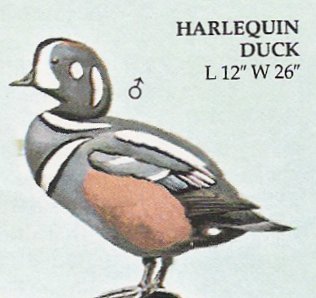
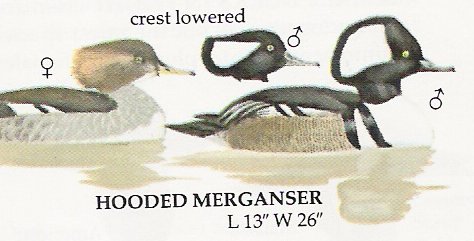

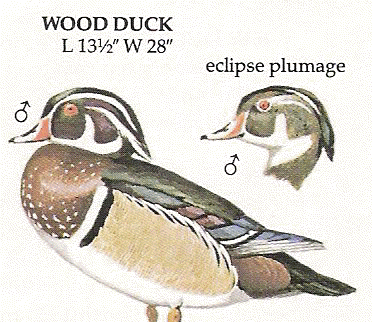
And before, we leave this subject.
What did creatures do before they developed genitalia and the means of
reproduction? See, doesn't make sense does it?
If evolution doesn't make sense, then God
must be real.
Doesn't it make more sense to look at the
world around you and think that it must have been designed by a very intelligent
and powerful being who revels in creativity and beauty?
The current movement that supports the
theory of "Intelligent design" is a movement by many scientists whose
findings demonstrate to them the complex and beautiful way that the universe
works, on scales from very large to very small. They believe that the
complexity and interdependence that they find in nature is too perfect to be
arrived at by a theory as random as evolution.
If you can imagine an "Intelligent
Designer" like this deciding to create a universe that displays his/her
considerable talents, you can image a being who relishes the challenge, and sets out to create a world with
a whole host of widely varied ecosystems, land forms, etc... - and added to this
myriad of beautiful landscapes are an equally magnificent myriad of
creatures. Mammals, birds, fish, reptiles and insects of all shape, size,
color and description. You can imagine that the Designer took it as a
challenge to create as many different and unique creatures as could possibly be
thought of. An additional challenge would be how to order them in the
world generally, and specifically in their particular ecosystem, so that all of
the creatures could survive together, feed each other, assist each other and so
that this cycle could continue unassisted and uninterrupted for generations.
If you start to study the Creation around us
with this "theory" in mind, it starts to make much more sense, and it
starts to fill you with a sense of wonder and awe.
God made this world. Thank you God, it
really is quite an elegant work of art.
Reasons why you wouldn't admit to believing
in God
You are worried about what people you know
might think about you. If this is your reasoning, you have a serious
problem that you should start working on immediately. The first step to
living a truly fulfilling and successful life is to abandon the social
entrapment of caring what other people think.
You think that if you really let yourself
believe in God, that you'll have to give up a lifestyle that you currently
enjoy. The truth is that believing in God is just a first step. If
you truly believe, then you will start to see the world differently - with
different values - through a different lens. The lifestyle that you enjoy
now, and are so afraid of losing, will most likely become stale and
unrewarding. You will start to feel the amazing security of knowing that
you have the important things figured out. Karl Marx would tell you that
this is the "euphoria" or the "opiate" feeling that religion
was designed to instill in a people. Marx is just another in a long line
of scientists trying to explain the unexplainable with the ridiculously small
and inadequate "experience" of mankind.
The truth is that any reason you can come up
with for not believing in God is strictly a reason that you're inventing to
protect yourself from something.
You're letting your selfish concerns keep
you from even considering the truth, even though the proof stares back at you
everyday. Every leaf, every creature you see, the sunrise, the
sunset. You stubbornly ignore the evidence, and move on with your
"life" trying to make yourself happy by making other people happy.
Making yourself happy by making other people
happy is a sure path to misery and an unfulfilled life.
Have some courage to believe what is obvious
and to accept the ramifications of that belief.
Find a church where you feel comfortable.
At the very least, find someone in your life
who you know believes in God, and who you respect. Ask them why they
believe in God. Start a conversation. Often, you'll realize that
there are more people out there that believe in God than you may
realize.
Learn
how organized religion has turned many against the Truth
|